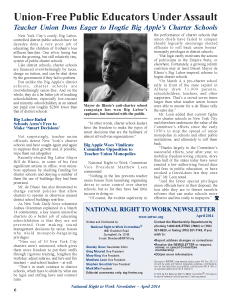Is This Any Way to Run a City’s Schools?
Leaked CTU Proposals Won’t Do Anything to Improve Schools’ Poor Performance
(Click here to download the April 2014 National Right to Work Committee Newsletter)
Teacher Union Dons Eager to Hogtie Big Apple’s Charter Schools
 New York City’s costly, Big Labor-controlled district public schools have for decades done a very poor job of educating the children of Gotham’s less affluent families. One silver lining has been the growing, but still relatively tiny, system of public charter schools.
New York City’s costly, Big Labor-controlled district public schools have for decades done a very poor job of educating the children of Gotham’s less affluent families. One silver lining has been the growing, but still relatively tiny, system of public charter schools.
Like district schools, charter schools are financed overwhelmingly by taxes, charge no tuition, and can be shut down by the government if they fail to perform.
But unlike the Big Apple’s district schools, charter schools are overwhelmingly union-free. And on the whole, they do a far better job of teaching schoolchildren, especially low-income and minority schoolchildren, at an annual per pupil cost roughly $2300 lower than that of district schools.
Big Labor-Ruled Schools Aren’t Free to Make ‘Smart Decisions’
Not surprisingly, teacher union officials detest New York’s charter schools and have sought again and again to suppress their growth and, if possible, wipe them out altogether.
Recently-elected Big Labor Mayor Bill de Blasio, in some of his first significant actions in office, won union-boss applause by slashing funding for charter schools and denying a number of them the use of buildings they had been promised.
Mr. de Blasio has also threatened to change current policies that allow charters to operate in otherwise unused district school buildings rent-free.
As New York Daily News columnist Joshua Greenman explained in a March 14 commentary, a key reason union-free charters do a better job of educating schoolchildren is that they are not prevented from making sound management decisions by union bosses who wield monopoly-bargaining privileges:
“Nine out of 10 New York City charters aren’t unionized, which gives them more freedom to put their staffs through rigorous training, lengthen the workday, adjust salaries, and hire and fire teachers — and school leaders — at will.
“That’s in stark contrast to district schools, which have to abide by what can be rigid and stifling laws and contract rules.
“In other words, charter school leaders have the freedom to make the types of smart decisions that are the hallmark of almost all well-run organizations.”
Big Apple Woes Vindicate Committee Opposition to Teacher Union Monopolies
National Right to Work Committee Vice President Matthew Leen commented:
“Nothing in the law prevents teacher union bosses from launching organizing drives to seize control over charter schools, but so far they have had little success in doing so.
“Of course, the evident superiority in the performance of charter schools that union chiefs have failed to conquer should logically encourage elected officials to roll back union bosses’ monopoly privileges in district schools.
“But logic rarely motivates the actions of politicians in the Empire State, or elsewhere. Fortunately, a growing reform coalition may at least thwart Mayor de Blasio’s Big Labor-inspired scheme to hogtie charter schools.
“On March 4, a pro-charter school rally in front of the state capitol in Albany drew 11,000 parents, schoolchildren, teachers, and other supporters. That’s a crowd seven times larger than what teacher union bosses were able to muster for a de Blasio rally the same day.”
Mr. Leen added that current fights over charter schools in New York City and elsewhere underscore the value of the Committee’s efforts since the early 1970’s to stop the spread of union monopolies in schools and other public institutions, and ultimately to roll them back.
“Thanks largely to the Committee’s successful efforts, year after year, to mobilize freedom-loving citizens, more than half of the states today have never enacted a law authorizing forced dues and fees in public education, or have revoked a forced-dues law they once had,” Mr. Leen noted.
“And the fewer special privileges union officials have at their disposal, the less able they are to thwart sensible reforms that can make schools more effective and less costly to taxpayers.”

Leaked CTU Proposals Won’t Do Anything to Improve Schools’ Poor Performance

Wherever Big Labor wields the power to collect forced union dues, union bosses funnel a large share of the confiscated money into efforts to elect and reelect business-bashing politicians. Employment growth tends to lag as a consequence.

Members Insist They Keep Pro-Right to Work Campaign Promises